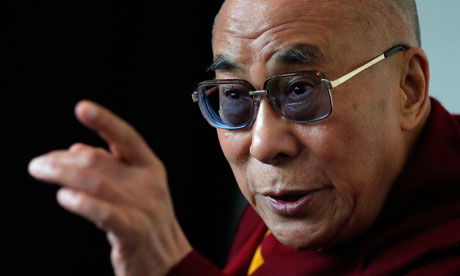Don't be taken in by the Shangri La factor. If seeking guidance in Buddhism, choose your teacher carefully

The Dalai Lama has warned against being seduced into Tibetan Buddhism by its exotic tantric aura.' Photograph: Phil Noble/Reuters
A senior monk at Kagyu Ling, a Tibetan Buddhist centre near Dijon in France, has become the first ordained lama in the developed world to be imprisoned. Lama Tempa Dargye is being held in provisional detention, following allegations of rape and sexual violence by four women. One woman alleged that she was aged nine when she was raped. French police have also launched an investigation into financial irregularities at the centre.
Controversy over Kagyu Ling might then have died down – except for the fact that a woman known as Sandrine decided to tell her story of rape and sexual violence to the gendarmerie. At first she was a lone voice, but recently three more women decided to testify; Lama Tempa was arrested and the police investigation is ongoing.
The events at Kagyu Ling are currently making headlines in France, but Tibet-watchers worldwide are aware that many more scandals have surfaced since the lamas fled their homeland in the late 1950s, following the Chinese takeover of Tibet. Some examples: in America followers of the late Trungpa Rinpoche were horrified to learn that his appointed successor, the late Thomas Rich appeared to have infected several people with HIV.
In 1994 the high-profile lama Sogyal Rinpoche was sued in California for sexual assault by a woman known as Janice Doe. The suit was settled out of court with substantial damages paid to the plaintiff. Rumours aboutSogyal's sexual exploits have circulated on the internet ever since. In Canberra, Australia, a respected Tibetan guru called Lama Choedak was forced to make a public apology after multiple affairs with his female students came to light.
In the UK Michael Lyons, aka Mohan Singh, is serving 10 years in prisonafter being convicted of rape. He posed as a Tibetan lama, but had no authentic qualifications. The followers of an American, Geshe Michael Roach, ordained as a Tibetan monk, attracted media attention when one of them died in bizarre circumstances after being ejected from a three-year retreat at a remote mountain centre in Arizona. "Michael Roach teaches an extremely exaggerated, and from a Buddhist perspective somewhat dubious, form of tantrism," says Lama Jampa Thaye, an Englishman from Manchester who has been teaching Tibetan Buddhism for more than 30 years.
The Shangri La factor is undoubtedly significant in the explosion of interest in Tibetan Buddhism around the world. The Dalai Lama's Nobel prize and his saintly reputation is another. His Holiness has an impressive track record in favour of nonviolence and as a champion of human rights – and he has warned against being seduced into Tibetan Buddhism by its exotic tantric aura, with hints of arcane sexual practices. Although he has never named and shamed any individual lama, he has recently publicly acknowledged that "some tulkus have behaved badly". He also cautions against rushing into commitment to a lama. "In Tibet", he says, "it could take 12 years before a lama-disciple relationship was established." He points out that it is a big responsibility and should not be undertaken lightly by either party.
So if you are attracted to Tibetan Buddhism, have read some books and learned some meditation techniques and now want to delve in deeper – how do you guard against being fooled by a charismatic charlatan? What criteria do you apply to your search for an authentic teacher? Lama Jampa Thaye's advice reflects a commonsense approach:
"Although one may come across examples of authentic Buddhist masters who dress or speak unconventionally, there is no licence in Buddhism for unethical behaviour. Thus oriental or occidental masters who claim their selfish and abusive behaviour is a display of 'skilful means' or 'crazy wisdom' are to be given a wide berth – unless we want to jump over a cliff hand in hand with them."
No comments:
Post a Comment